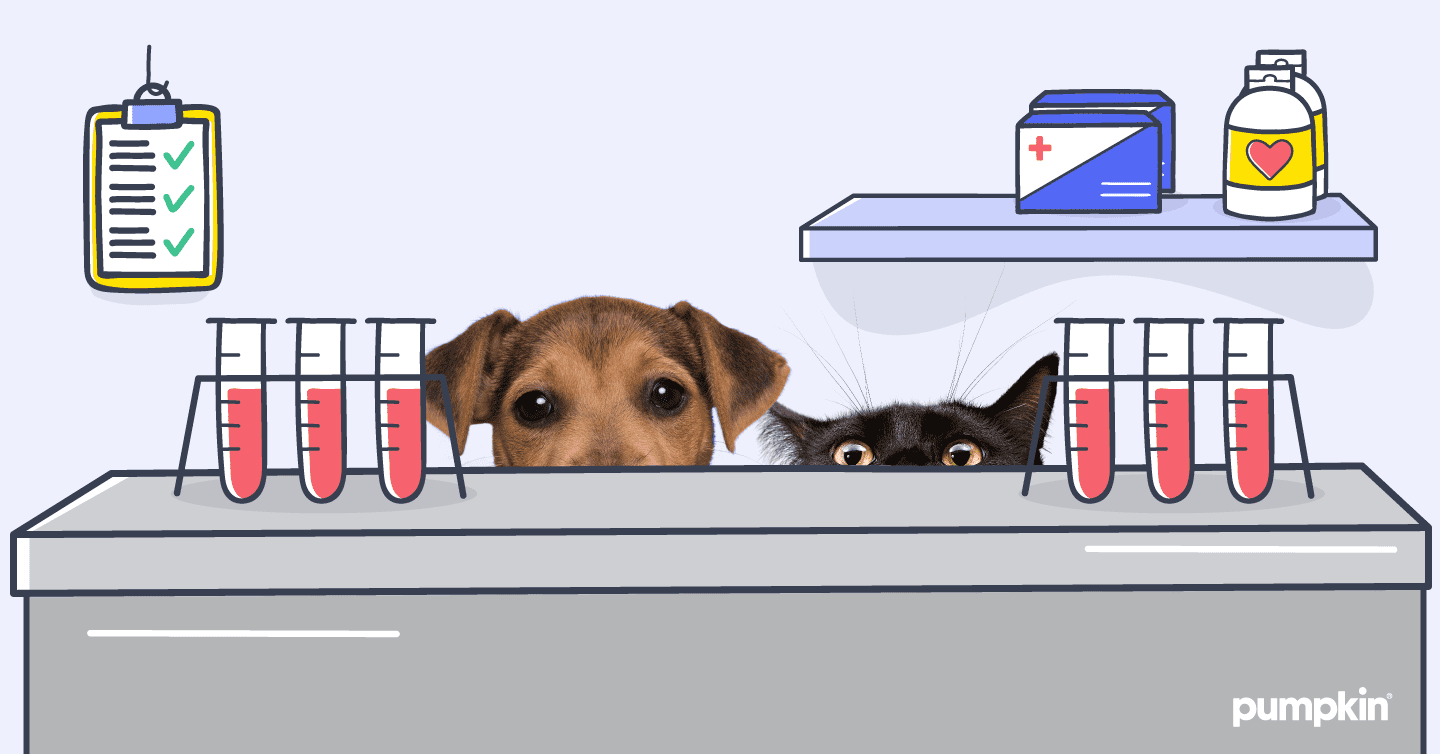Many of us feel a little squeamish where blood is concerned, but blood tests are a useful way for veterinarians to understand our pet’s overall health. Blood tests are a common form of diagnostic testing, so naturally, pet owners want to know: does pet insurance cover blood work?
Let’s find out with a comprehensive deep dive into pet insurance and wellness coverage for blood work!
What is blood work?
Sometimes, your vet will need to obtain blood from your pet to test it for levels of proteins or chemicals – this is blood work! Blood tests can be done as a general routine measure, but veterinarians can also do specific blood testing, for example, to detect if a specific toxin is present. Abnormalities in blood tests can show if a pet has an infection, cancer, organ problems, and many other health issues that need immediate treatment.
When might my pet need blood work?
Blood work is an essential diagnostic test in veterinary medicine. It can be used to help veterinarians understand what’s wrong with a pet when they’re displaying unusual symptoms, or it can be used as a preventive care measure to help detect illnesses and health conditions early.
One of the most common reasons blood tests are done is to diagnose heartworm in dogs. Unlike other parasite infections that can be diagnosed with a fecal test, a blood test is necessary to confirm whether or not heartworm is present. If the test shows a dog is positive for heartworm proteins, your vet can begin a course of treatment. Luckily, there are effective methods available to pet owners to prevent heartworm in dogs.
Does pet insurance cover blood work?
Yes, most pet insurance plans cover blood work when used to diagnose a covered accident or illness. Let’s look at two example scenarios where most pet insurance plans would cover a blood test.
- Your puppy is showing signs of sudden toxin poisoning, but you’re not sure what they ate. The veterinarian performs a blood test to detect the toxin.
- Your cat has suddenly become lethargic, stopped eating, and is losing weight. Your vet suspects kidney disease and performs a blood test to assess kidney function.
In both scenarios, the blood test would be covered as it’s being used to help diagnose an unexpected accident or illness.
When will pet insurance not cover blood work?
Here are two examples in which pet insurance would most likely not cover blood work. These are:
- If the blood work has been used to diagnose a pre-existing condition in your pet. A pre-existing condition is an illness or injury that occurred before your pet insurance plan coverage started or during a waiting period. This can also include signs and symptoms of illnesses or injuries. Most pet insurance plans don’t cover pre-existing conditions. Pet insurance won’t cover blood work if it’s used for a situation that’s excluded from coverage.
- If the blood work was performed as part of a routine checkup and no illness or disease was present. Most standard pet insurance plans don’t cover routine wellness care.
In both scenarios, the blood test is being performed for situations that are usually excluded from pet insurance coverage.
Does pet insurance cover other types of diagnostic testing?
Blood work is just one test included under the umbrella of diagnostic testing that pet insurance may cover. Many pet insurance plans cover different types of diagnostic tests, other than blood work, for unexpected accidents and illnesses. It’s important to have pet insurance coverage for this so you have help saying ‘yes’ to your veterinarians care recommendations.
Blood work can help veterinary staff put your pet’s symptoms into context and paint a more clear picture of what’s going on. Many symptoms of an accident or illness can’t be observed by the naked eye. In addition to blood work, other types of diagnostic testing can help your vet determine if your pet is sick or hurt. Some common diagnostics include:
- Ultrasounds
- CT scans
- CAT scans
- X-rays
- MRI scans
Do wellness plans cover blood work?
Routine blood work is a common service that many wellness plans include in their coverage. Unlike pet insurance plans which offer accident and illness coverage, wellness plans offer coverage for preventive care services. These are services you get for your pet for the sole purpose of helping prevent health problems down the road. Here are some examples of common preventive care services:
- Vaccines
- Physical exams
- Fecal tests
- Blood work
- Dental cleanings
- Grooming services
- Nail trimming
- Spaying and neutering
- Parasite preventatives, like heartworm prevention
Pet insurance and non-insurance preventive care packages are different types of products with different types of coverage. Keep in mind that every pet insurance provider is different and each one offers different wellness options. Research each provider’s plans to see what will and won’t be covered.
Pumpkin’s wellness package is called Preventive Essentials, and it gives pet parents a 100% refund for 3 essential routine care services that all vets recommend:
- Annual Wellness Exam – Full refund for the exam fee for your pet’s annual checkup, tests & vaccines
- Annual Vaccines – Full refund for any 4 vaccines for puppies, 2 for dogs, & 1 for cats each year
- Yearly Screening Tests – Full refund for 1 fecal test for all pets + 1 vector-borne disease or heartworm-only test for dogs
Preventive Essentials isn’t insurance – it’s an optional add-on that you can add to your Pumpkin plan.
Why is blood work important for preventive pet health care?
The earlier your vet can detect what is wrong with your pet, the better their treatment options and recovery. Blood tests are just one type of test that can help detect health problems before they become serious. Taking your pet for routine blood tests on an annual basis helps your vet catch problems early, and this ultimately helps pets live longer and healthier lives.
What else is included in pet insurance coverage?
Most pet insurance plans are accident and illness plans, meaning they are designed to cover unexpected accidents and illnesses that pop up over your pet’s life. Coverage differs for each provider, but here are some examples of accidents and illnesses that Pumpkin plans cover:
- Toxin ingestion
- Broken bones
- Skin, eye, and ear infections
- Cuts, wounds, and lacerations
- Respiratory illnesses
- Dental illnesses
- Behavioral issues
- Digestive illnesses
- Parasites and infectious diseases
- Hereditary conditions
- Congenital conditions
- Chronic conditions
- Orthopedic injuries and conditions, like hip dysplasia
Here are examples of diagnostics and treatment costs that Pumpkin plans reimburse for covered accidents and illnesses:
- Vet exam fees
- Hospitalization
- Rx medication
- Rx food & supplements
- Surgery
- Advanced care
- Specialized care, like stem cell therapy
- X-rays, MRIs, blood tests, and CAT scans
- Rehabilitation therapies, like hydrotherapy and physical
Does pet insurance cover pre-existing conditions?
Almost all pet insurance policies have an exclusion for pre-existing conditions. This means the policies will not cover illnesses or injuries that occurred, or showed signs or symptoms of occurring before your pet insurance plan coverage starts or during a waiting period. Pet insurance companies have different guidelines on what they do and do not consider a pre-existing condition, so it’s important to consult your policy agreement.
How much does pet insurance cost?
Pet insurance tends to be uniquely priced for every pet. Most pet insurance providers use a variety of factors to price your plan including your pet’s species (cat or dog), your pet’s age, and your location. The price of your plan also depends on the options you select, like your annual deductible, annual coverage limit, reimbursement rate, and any other add-on coverage or packages you choose to add.
The easiest and fastest way to see how much pet insurance would cost for your pet is to fill out a free pet insurance quote online. It takes less than five minutes and will give you a price then and there.
Why do I need pet insurance?
A sudden accident or illness can be an extremely scary and stressful time. Take the example of accidental toxin poisoning. If your pup eats something they shouldn’t, the cost of veterinary bills for the treatment they need can mount up fast. They may need things like hospitalization fees, blood work, IV fluids, or even surgery.
Pet insurance can help you afford costly vet bills by reimbursing you for a portion of all eligible vet bills for accidents & illnesses. This is a huge benefit to pet parents as they have help affording the best care possible for their pets.
Pumpkin plans offer all pet parents the option of 90% cash back on eligible vet bills. See how much a plan would cost for your pet with an easy online quote.




